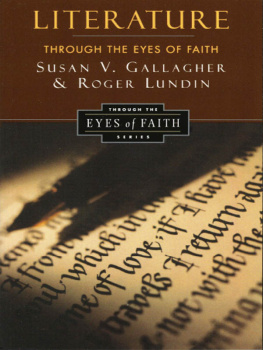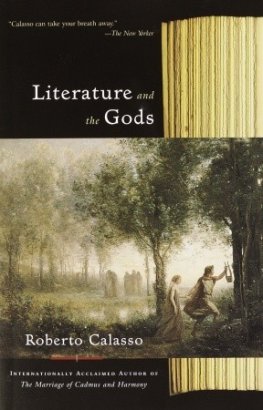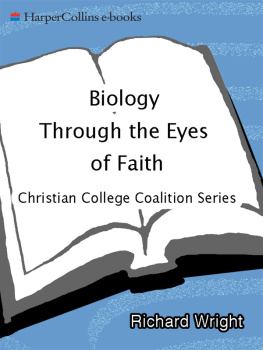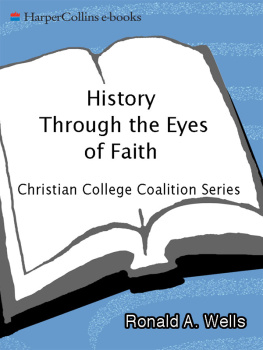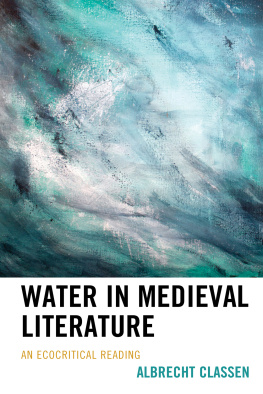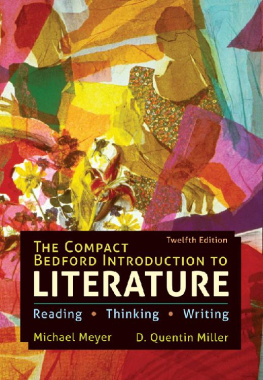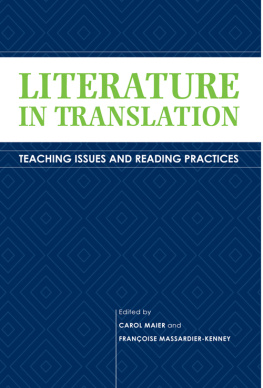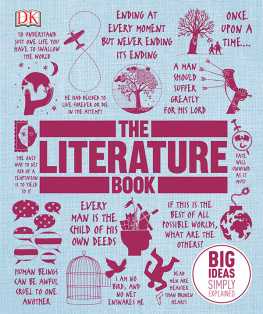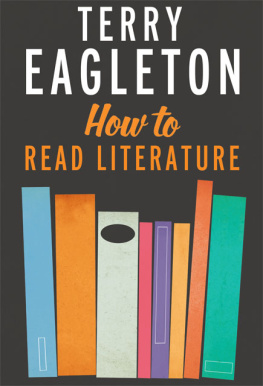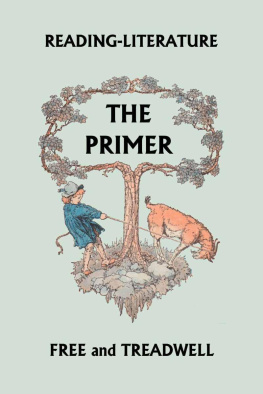Biology Through the Eyes of Faith
Business Through the Eyes of Faith
History Through the Eyes of Faith
Music Through the Eyes of Faith
Psychology Through the Eyes of Faith
Sociology Through the Eyes of Faith

The Christian College Coalition is an association of Christian liberal arts colleges and universities across North America. More than 30 Christian denominations, committed to a variety of theological traditions and perspectives, are represented by our member colleges. The views expressed in this volume are primarily those of the author(s) and are not intended to serve as a position statement of the Coalition membership. For more information please contact the Christian College Coalition at 329 Eighth Street NE, Washington, DC 20002.
LITERATURE THROUGH THE EYES OF FAITH . Copyright 1989 by Christian College Coalition. All rights reserved under International and Pan-American Copyright Conventions. By payment of the required fees, you have been granted the non-exclusive, non-transferable right to access and read the text of this ebook on-screen. No part of this text may be reproduced, transmitted, down-loaded, decompiled, reverse engineered, or stored in or introduced into any information storage and retrieval system, in any form or by any means, whether electronic or mechanical, now known or hereinafter invented, without the express written permission of HarperCollins ebooks.
Library of Congress Cataloging-in-Publication Data
Lundin, Roger.
Literature through the eyes of faith.
1. Christianity and literature. 2. Christianity in literature. I. Gallagher, Susan V. II. Title.
PN49.L86 1989
809 8845684
ISBN: 9780060653187
07 08 09 10 11 RRD(H) 10 9 8 7 6 5 4 3 2 1
EPub Edition MAY 2013 ISBN: 9780062295569
LITERATURE TASK FORCE MEMBERS
Gaymon Bennet
Northwest Nazarene College
Edward E. Ericson, Jr.
Calvin College
Paul Nisly
Messiah College
Ann Paton
Geneva College
Nancy M. Tischler
Penn State University
SERIES ADVISORY BOARD MEMBERS
Nicholas Wolterstorff, Editor in Chief
Calvin College
Free University of Amsterdam
David Benner
Redeemer College
Richard Bube
Stanford University
David Allen Hubbard
Fuller Theological Seminary
Karen Longman
Christian College Coalition
Ann Paton
Geneva College
Timothy Smith
Johns Hopkins University
Richard T. Wright
Gordon College
T here have always been theoretical issues concerning the composition and reading of literature and concerning the nature of the literary text. And there have always been controversies concerning the answers to these issues. Until quite recently, however, most teachers of literature apparently felt that such issues could be avoidedmany felt that they should be avoided. Literature, they felt, could be read and appreciated without entering the controversies of theorists.
That day of innocence is rapidly disappearing. To more and more teachers of literature it is becoming evident that the way they had been reading and appreciating literature did not steer clear of the issues raised by theorists but took positions on those issues. So too, what they had been saying about the literary text took stands on such issues. And the texts they had their students read did not reflect some purely objective recognition of greatness but presupposed certain values with which other intelligent and committed people disagreed.
Literature, which once appeared to be a resting place from the rigors of theory, has become a battleground of theory.
One of the great merits of this new book by professors Gallagher and Lundin is that, in their approach to literature, they openly and straightforwardly enter this battleground. They do not try to go around it. With courageous honesty they face up to the issues, lay them out clearly, and frequently themselves take a stand. They do so in graceful, readable prose. And more remarkably, perhaps, they do not forget literature in the excitement of engaging in the theoretical debates. They never forget that the point is not to keep theorists busy but to illuminate literature.
This would be enough to make this book a significant contribution. But I have not yet mentioned its chief distinction. Professors Gallagher and Lundin have not simply added another book to the ongoing discussion about literature. Their guiding question is this: How does literature look when seen through the eyes of faith by someone informed on the theoretical issues? The shape of their book has been determined by their address to those questions which, in their judgment, a reflective Christian should be raising when engaged with literature.
In the course of addressing themselves to these questions, Gallagher and Lundin begin to work out a fresh and imaginative approach to literature. Most Christian reflections on literature, over the last century, have been, in a rough-and-ready way, Romantic. Gallagher and Lundin believe that a Romantic approach can no longer be defended. This is one of the very first attempts to provide a Christian perspective on literature which is non-Romantic in character. It is not an exaggeration to say that their work is path-breaking.
This book thus achieves that almost impossible task of being of interest both to the Christian who just wants some basic questions about literature discussed, and to the Christian who has read around in the recent theoretical disputes about literature and wants some illumination on those confusing disputes. At the same time it will be of interest to the non-Christian who wants to see how two gifted scholars who care very much about literature, who are deeply committed to the Christian faith, and who are eminently informed about the recent disputes in critical theory, struggle to bring together into a creative whole these sides of their existence. In our fragmented world, such attempts at wholeness are uncommon. When we come across them, we can all learn.
Nicholas Wolterstorff
Professor of Philosophy
Calvin College &
The Free University of Amsterdam
T his book explores the relationship of the Christian faith to the study of literature. Its goal is to help students of literature understand more clearly the nature of language and literature, to acquaint them with the tools of literary study, and to introduce them to the rich history of Christian reflection on literature, language, and the reading experience. To that end, we have included in the book discussions of the theory and history of literature as well as practical advice for the study of it. We have sought to make our general points about literature by exploring specific examples of literary art.

